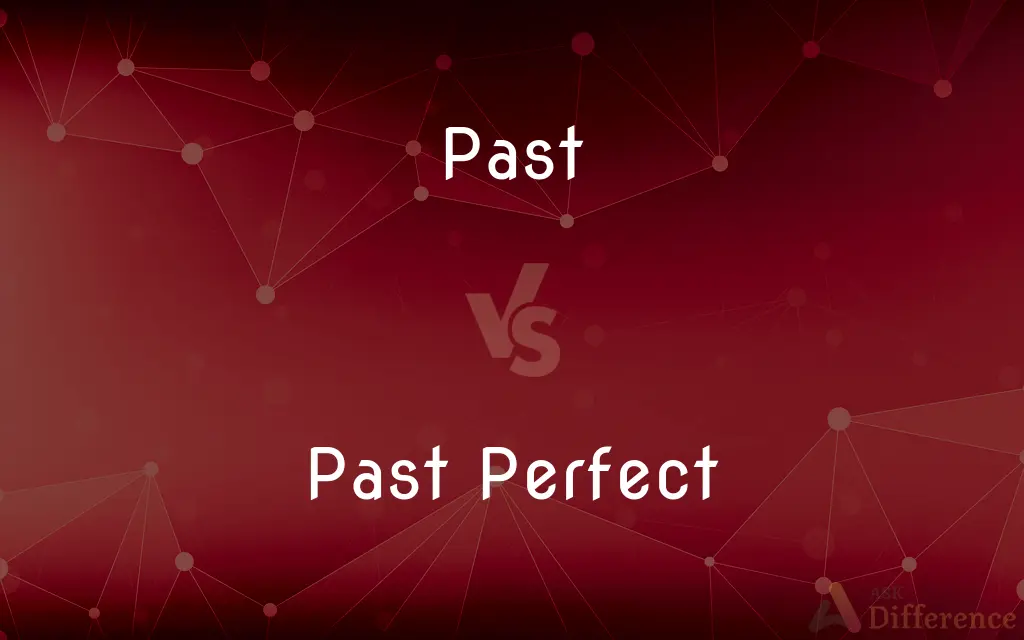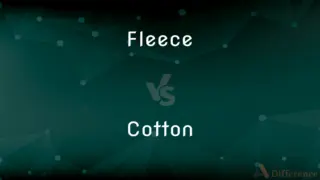Past vs. Past Perfect — What's the Difference?
By Fiza Rafique & Maham Liaqat — Published on February 19, 2024
Past tense describes actions or events that happened at a specific time in the past. Past Perfect tense describes actions that were completed before another action or event in the past.

Difference Between Past and Past Perfect
Table of Contents
ADVERTISEMENT
Key Differences
The past tense in English grammar is used to describe actions or events that have occurred at a definite time in the past. It is the basic form of the past narrative and is used to express completed actions. For example, "I walked to the park" directly states that the action of walking occurred in the past.
The Past Perfect tense, however, adds a layer of complexity, describing actions that were completed before another past action or event. It is formed using "had" followed by the past participle of the verb. This tense is used to emphasize the sequence of events or to express causality. For example, "I had walked to the park before it started raining" indicates that the walking occurred before the rain, highlighting the sequence.
The key difference between the two tenses lies in their use to convey time relationships in the past. The Past tense is straightforward, indicating that something happened in the past. The Past Perfect, in contrast, is used specifically to indicate that an action was completed before another action or moment in the past, offering a clearer timeline of events.
While the Past tense is commonly used in everyday conversation and writing to narrate past events, the Past Perfect is particularly useful in literature, formal writing, and when providing detailed narratives that require clarification of event sequences or causality in the past.
Understanding when to use the Past versus the Past Perfect tense is crucial for accurate and clear communication, especially when detailing sequences of events or discussing actions that have a specific order or relationship to each other in the past.
ADVERTISEMENT
Comparison Chart
Form
Simple past form of the verb (walked, saw, did)
Had + past participle of the verb (had walked, had seen, had done)
Usage
Describes actions/events at a specific time in the past
Describes actions completed before another past action/event
Function
Narrates past events
Emphasizes sequence or causality in past narratives
Example
She traveled to Paris last year.
She had traveled to Paris before she moved to London.
Emphasis
On the action/event itself
On the completion of an action before another past occurrence
Compare with Definitions
Past
Describes completed actions or events.
We visited the museum yesterday.
Past Perfect
Uses had + past participle verb form.
They had left the station when we arrived.
Past
Simple structure without auxiliary verbs.
She laughed at the joke.
Past Perfect
Describes an action completed before another past event.
He had finished his homework before dinner.
Past
Narrates historical facts or personal experiences.
Julius Caesar crossed the Rubicon in 49 BC.
Past Perfect
Highlights causality between past events.
She was tired because she had been running.
Past
Indicates a specific time in the past.
They bought a new car last month.
Past Perfect
Sets the background in narratives.
By the time the play began, the audience had taken their seats.
Past
Used for storytelling or reporting.
The hero saved the day.
Past Perfect
Indicates the first of two past actions.
I had never seen such a beautiful sunset before that day.
Past
No longer current; gone by; over
His youth is past.
Past
Having existed or occurred in an earlier time; bygone
Past events.
In years past.
Past
Earlier than the present time; ago
40 years past.
Past
Just gone by or elapsed
In the past few days.
Past
Having served formerly in a given capacity, especially an official one
A past president.
A past inmate of a cell.
Past
(Grammar) Of, relating to, or being a verb tense or form used to express an action or condition prior to the time it is expressed.
Past
The time before the present.
Past
Previous background, career, experiences, and activities
An elderly person with a distinguished past.
Past
A former period of someone's life kept secret or thought to be shameful
A family with a checkered past.
Past
The past tense.
Past
A verb form in the past tense.
Past
So as to pass by or go beyond
He waved as he walked past.
Past
Beyond in time; later than or after
Past midnight.
A quarter past two.
Past
Beyond in position; farther than
The house is a mile past the first stoplight. They walked past the memorial in silence.
Past
Beyond the power, scope, extent, or influence of
The problem is past the point of resolution.
Past
Beyond in development or appropriateness
The child is past drinking from a bottle. You're past sucking your thumb, so don't do it.
Past
Beyond the number or amount of
The child couldn't count past 20. See Usage Note at pass.
Past
The period of time that has already happened, in contrast to the present and the future.
A book about a time machine that can transport people back into the past
Past
(grammar) The past tense.
Past
Having already happened; in the past; finished.
Past glories
Past
(postmodifier) Following expressions of time to indicate how long ago something happened; ago.
Past
Of a period of time: having just gone by; previous.
During the past year
Past
(grammar) Of a tense, expressing action that has already happened or a previously-existing state.
Past tense
Past
In a direction that passes.
I watched him walk past
Past
Beyond in place or quantity
The room past mine
Count past twenty
What's the time? - It's now quarter past twelve midday (or 12.15pm).
Past
No longer capable of.
I'm past caring what he thinks of me.
Past
Having recovered or moved on from (a traumatic experience, etc.).
Past
Passing by, especially without stopping or being delayed.
Ignore them, we'll play past them.
Please don't drive past the fruit stand, I want to stop there.
Past
(obsolete) pass
Past
Of or pertaining to a former time or state; neither present nor future; gone by; elapsed; ended; spent; as, past troubles; past offences.
Past
A former time or state; a state of things gone by.
The present is only intelligible in the light of the past, often a very remote past indeed.
Past
Beyond, in position, or degree; further than; beyond the reach or influence of.
Until we be past thy borders.
Love, when once past government, is consequently past shame.
Past
Beyond, in time; after; as, past the hour.
Is it not past two o'clock?
Past
Above; exceeding; more than.
Not past three quarters of a mile.
Bows not past three quarters of a yard long.
Past
By; beyond; as, he ran past.
The alarum of drums swept past.
Past
The time that has elapsed;
Forget the past
Past
A earlier period in someone's life (especially one that they have reason to keep secret);
Reporters dug into the candidate's past
Past
A verb tense that expresses actions or states in the past
Past
Earlier than the present time; no longer current;
Time past
His youth is past
This past Thursday
The past year
The present leader
Articles for present use
The present topic
The present system
Present observations
Past
Of a person who has held and relinquished a position or office;
A retiring member of the board
Past
A verb tense or other construction referring to events or states that existed at some previous time;
Past participle
Past
So as to pass a given point;
Every hour a train goes past
Common Curiosities
How do I form the Past Perfect tense?
Use "had" followed by the past participle of the main verb.
Can the Past Perfect be used without a specific time?
Yes, it often sets the scene or shows causality without a specific time.
Can I use the Past Perfect on its own?
It's usually part of a narrative involving another past action for context.
Do I always need to use Past Perfect when talking about the past?
No, use it when emphasizing the sequence or causality of past events.
Are there exceptions to using the Past Perfect?
Its use can be flexible in conversational English but is more strictly observed in formal writing.
Can Past and Past Perfect tenses be used in the same sentence?
Yes, often the Past Perfect sets up an earlier event, followed by a simple Past tense action.
Can the Past Perfect imply causality?
Yes, it can indicate that one past action caused another.
When should I use the past tense?
For actions or events that happened at a specific time in the past.
What is the main function of the Past Perfect tense?
To show that one past event happened before another.
How does the Past Perfect affect the clarity of a narrative?
It clarifies the order of past events, making narratives easier to understand.
Does the Past Perfect always need a following past simple action?
Not always, but it often appears in contexts where the sequence of events is important.
How can I practice distinguishing between Past and Past Perfect?
Reading complex narratives and practicing writing sentences in both tenses can help clarify their uses.
Is it incorrect to use the Past instead of the Past Perfect?
It depends on the context; incorrect usage can sometimes lead to ambiguity about event sequences.
How do I know if I should use Past or Past Perfect?
Consider if you're describing a simple past action or showing that one action happened before another.
What's the difference in time expressions used with Past and Past Perfect?
Past tense often uses specific time expressions (yesterday, last week), while Past Perfect may not.
Share Your Discovery

Previous Comparison
Fleece vs. Cotton
Next Comparison
RJ45 vs. CAT6Author Spotlight
Written by
Fiza RafiqueFiza Rafique is a skilled content writer at AskDifference.com, where she meticulously refines and enhances written pieces. Drawing from her vast editorial expertise, Fiza ensures clarity, accuracy, and precision in every article. Passionate about language, she continually seeks to elevate the quality of content for readers worldwide.
Co-written by
Maham Liaqat













































